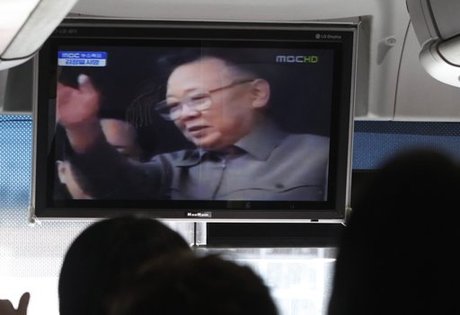World Reacts to N. Korea Leader’s Death
إقرأ هذا الخبر بالعربية
Minutes after the announcement of North Korean leader Kim Jong-Il’s death, the world leaders were on alert on Monday urging Pyongyang to engage with the global community.
The United States swiftly closed ranks with its ally South Korea, as President Barack Obama called his close friend President Lee Myung-Bak of South Korea at midnight on the U.S. east coast, as Washington and its regional allies digested the death of the Stalinist state's volatile 69-year-old leader.
"The President reaffirmed the United States' strong commitment to the stability of the Korean peninsula and the security of our close ally, the Republic of Korea," the White House said in a statement.
South Korea ordered its military on emergency alert and increased border air surveillance.
Seoul also asked its U.S. ally, which stations 28,500 troops in the South, to step up surveillance by planes and satellites, a JCS spokesman said.
No unusual activity had been observed from the North, officials said.
President Lee ordered all government officials on emergency response status, meaning they are restricted from taking leave or traveling.
Kim's death came as North Korea and the United States were making tentative efforts to restart stalled six-nation talks on the North's nuclear program.
Nuclear envoys from Washington and Pyongyang met in New York in July and in Geneva in October, but reported no breakthrough. South Korea's Yonhap news agency said that a third meeting could have taken place soon.
Meanwhile, Japan called an emergency security meeting to formulate its reaction to news of the death of Kim.
Japanese Prime Minister Yoshihiko Noda cancelled a speech and rushed back to his office where he held a meeting of senior ministers.
"I am aware that the report has been made. I have instructed that the facts be checked," he told reporters after returning to his office.
He said he had ordered officials to beef up intelligence-gathering on North Korea, to work closely with the United States, China and South Korea, and to prepare for further unexpected developments.
U.N. Secretary General Ban Ki-moon was among world leaders put on alert over the death of Kim Jong-Il, officials said.
"The secretary general is aware but of the reports but we don't have an immediate reaction," U.N. spokesman Martin Nesirky told Agence France Presse.
The United Nations has been desperately trying to raise international funds to provide food for North Korea. It appealed for $218 million dollars this year but less than 20 percent has been raised.
Ban, who is from South Korea, has in turn regularly expressed concern at the deadlock in international talks on the North's nuclear arms program. He said last week that the mood on the Korean peninsula was almost "frozen".
Australia also said it was critical governments exercised calm and restraint after the death announcement.
Australian Foreign Minister Kevin Rudd said nuclear North Korea was the single most armed military zone anywhere in the world and it was at a critical juncture.
"Two critical points need to be emphasized at this important time," he said.
"The first is that all governments, including the government of North Korea, should at this time be exercising maximum calm and restraint both in terms of what they do and in their diplomatic signaling.”
Rudd said Canberra would remain in close contact with allies the region in the days and weeks ahead, with the leadership transition "uncertain".
Kim's youngest son Kim Jong-Un, who Rudd said was 28, is seen as the heir apparent.
China offered its "deep condolences" on the death of the North Korean leader Kim Jong Il, a foreign ministry spokesman said.
"We are shocked to learn that DPRK top leader comrade Kim Jong Il passed away and we hereby express our deep condolences on his demise and send sincere regards to the DPRK people," foreign ministry spokesman Liu Weimin said.
China is a neighbor and close ally of the isolated Stalinist state, whose official media announced on Monday that its leader had died of a heart attack at the age of 69 and that his son, Kim Jong-Un, would succeed him.
Analysts said his death would be a source of concern to stability-obsessed leaders in Beijing who would be anxious that Kim Jong-Un has not had enough time to secure control over the country's government and military.
Britain said Monday the death of Kim could be a "turning point" for the isolated nation and urged his successor to engage with the international community.
"The people of North Korea are in official mourning after the death of Kim Jong-Il. We understand this is a difficult time for them," said Foreign Secretary William Hague in a statement.
"This could be a turning point for North Korea.
"We hope that their new leadership will recognize that engagement with the international community offers the best prospect of improving the lives of ordinary North Korean people."
He also urged the nuclear-armed, famine-ridden state "to work for peace and security in the region and take the steps necessary to allow the resumption of the Six Party Talks on denuclearization of the Korean Peninsula".



